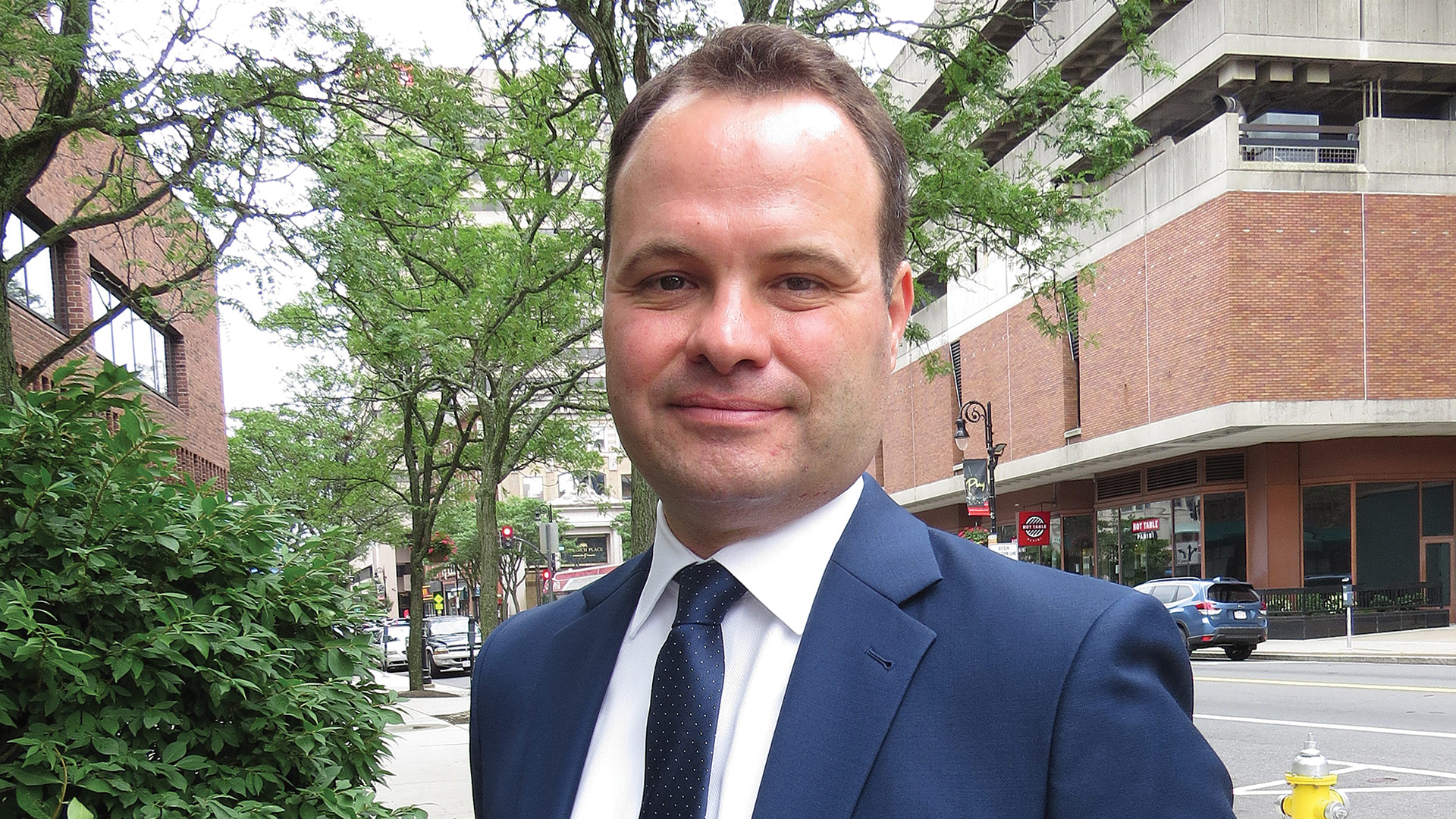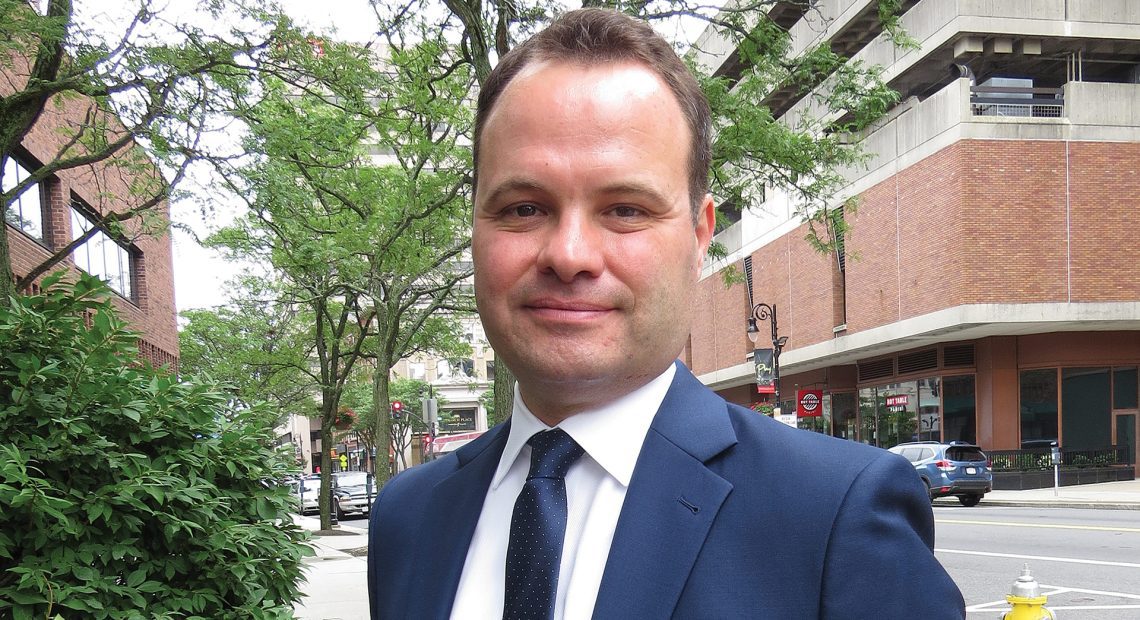The Shot Heard ’Round the Region
 Smith & Wesson’s recently announced plan to move its Springfield operations to Tennessee came as a shock to many — the 165-year-old company has been part of the city’s fabric, and the region’s rich manufacturing history, for generations. Amid questions about the gunmaker’s reasons for moving — the company cites proposed state legislation targeting its products, while some elected officials say it’s more a case of corporate welfare and a better deal down south — the most immediate concerns involve about 550 jobs to be lost. The silver lining is that, with some concerted effort, most of those individuals should be able to find other work locally in a manufacturing landscape that sorely needs the help.
Smith & Wesson’s recently announced plan to move its Springfield operations to Tennessee came as a shock to many — the 165-year-old company has been part of the city’s fabric, and the region’s rich manufacturing history, for generations. Amid questions about the gunmaker’s reasons for moving — the company cites proposed state legislation targeting its products, while some elected officials say it’s more a case of corporate welfare and a better deal down south — the most immediate concerns involve about 550 jobs to be lost. The silver lining is that, with some concerted effort, most of those individuals should be able to find other work locally in a manufacturing landscape that sorely needs the help.
In the wake of the announcement that Smith & Wesson will be moving its corporate headquarters from Springfield to Maryville, Tenn., questions and discussions have arisen on many levels.
These concern everything from how and when this decision came about to how aggressive Tennessee was in courting this major employer, to whether there were any major deciding factors in that decision beyond what has been stated repeatedly by the company — specifically, proposed state legislation that would ban the manufacture of most of the automatic weapons now made by Smith & Wesson.
But as the dust settles from that bombshell announcement, the lingering questions concern just what the region and the state have lost from the relocation of this company, one that can trace its roots back to 1856.
And the answers to that question don’t exactly come easily.
Western Mass. will lose roughly 550 jobs, according to the information released by the company — a significant number, to be sure, but economic-development leaders are quick to point out that just about every manufacturer has a ‘help wanted’ sign on the door, either figuratively or quite literally, and that any one of those Smith & Wesson employees who doesn’t want to relocate to Tennessee can find employment in the 413 quickly and easily (much more on that later).
“The reason they’re here, and the reason a lot of the jobs will remain here, is that you have a high-quality workforce. And that is probably the biggest issue companies are looking at right now. As a region, and as a state, we’re still a good place to do business.”
Meanwhile, the region will also lose a number of C-suite-level employees from the company that were involved in the community, sat on area boards and commissions, and engaged in philanthropic activity.
“They’re tied to the community,” said Richard Sullivan, president and CEO of the Western Massachusetts Economic Development Council (EDC). “And I think that, sometimes, those aspects of what it means to have a headquarters, the CEOs, and the team at any company get lost; it’s the tieback to the community, because they’re truly vested in the community and want to see it be the best it can be.”
Meanwhile, even though Smith & Wesson handguns and other products will still be made here, and we’re told they will be stamped ‘made in Springfield, Mass.,’ or words to that effect, the region will lose a certain amount of civic pride, if that’s the right term, that comes from having a large employer — and one of the most recognizable brands in the world — headquartered in the City of Homes. Indeed, many would say this company is part of not only the history, but the very fabric of the city.

State Sen. Eric Lesser says Smith & Wesson’s decision to relocate its headquarters and some operations may actually be a blessing in disguise on some levels.
However, those we spoke with said the region and city are unlikely to lose momentum when it comes to attracting employers and jobs, or its reputation as a manufacturing hub.
Indeed, Sullivan used the phrase “one-off” to describe Smith & Wesson’s decision, drawing a distinction between this pending departure and a much larger exodus, headlined by General Electric, that befell Connecticut several years ago.
“The reason they’re here, and the reason a lot of the jobs will remain here, is that you have a high-quality workforce,” he explained. “And that is probably the biggest issue companies are looking at right now. As a region, and as a state, we’re still a good place to do business.”
State Sen. Eric Lesser, who represents Springfield and several neighboring communities and serves as chair of the state’s Manufacturing Caucus, agreed, and then went further, noting that, amid some obvious losses, there are also some possible benefits to Smith & Wesson’s decision. He even used the phrase “potential blessing in disguise,” mostly to reference opportunities that other area manufacturers may have to stabilize and grow their ventures by hiring displaced S&W workers.
“Sometimes, when one door closes, another one opens, and this may be one of those times,” he told BusinessWest. “We have a very real economic challenge in terms of making sure that those 550 families are taken of. But this is a long-term horizon — they’re not doing this until 2023. Luckily for those families, the manufacturing sector is very hot, and really, almost every company in that sector, including companies right in that immediate neighborhood where Smith & Wesson is located, are looking for people.”
Lesser is one of many elected leaders who are not buying into Smith & Wesson’s contention that it’s moving its headquarters because of the pending legislation. He echoed comments from Massachusetts House Speaker Ronald Mariano, who told the local press that “prudent business people don’t make major decisions, especially a decision that puts hundreds of people out of a job, based on one of the thousands of bills filed each session.”
“The politics of Massachusetts have been the way they are for a very long time, and at the very same time that they announced a move in Springfield, they also announce they’re closing operations in Missouri, a state that has very lax gun laws.”
Lesser, noting the very attractive deal offered to Smith & Wesson by Tennessee, said the company’s motivation for relocating probably has little to do with Bay State politics. “This is more of a classic corporate-welfare story than it is anything else.”
Which is why it shouldn’t impact Springfield’s reputation as a manufacturing hub or its long-term potential to become more of one, noted Tim Sheehan, the city’s director of Planning & Economic Development.
“In this type of industry, Springfield has had a long history, and the skill levels in this area of manufacturing have been noted throughout the Connecticut River Valley,” he said. “I don’t think this sends a message about the city of Springfield — it’s a broader message.”
Targeted Response
The press release arrived in the inboxes of media outlets in this region — and well beyond — at 9:05 a.m. on Sept. 30. The headline over the top read “Smith & Wesson to Relocate Headquarters to Tennessee,” followed by the subhead, “Move includes headquarters and significant portion of operations due to changing business climate for firearms manufacturing in Massachusetts.”
The release went on to quote Mark Smith, president and CEO of the company, saying, “this has been an extremely difficult and emotional decision for us, but after an exhaustive and thorough analysis, for the continued health and strength of our iconic company, we feel that we have been left with no other alternative.”
He specifically cited legislation recently proposed in Massachusetts that, if enacted, would prohibit the company from manufacturing certain firearms in the state. “These bills would prevent Smith & Wesson from manufacturing firearms that are legal in almost every state in America and that are safely used by tens of millions of law-abiding citizens every day exercising their constitutional Second Amendment rights, protecting themselves and their families, and enjoying the shooting sports. While we are hopeful that this arbitrary and damaging legislation will be defeated in this session, these products made up over 60% of our revenue last year, and the unfortunate likelihood that such restrictions would be raised again led to a review of the best path forward for Smith & Wesson.”
The path taken — to Tennessee’s Blount County, which proudly describes itself as a “Second Amendment sanctuary” — is similar to the one taken by Troy Industries, the West Springfield-based maker of a wide array of guns and related products, which announced a move to Tennessee back in May.
So while there is precedent and the relocation sounds like part of a movement, many elected officials, including Lesser, were not exactly buying the company’s stated reason for leaving.
In fact, he referred back to that same press release for some evidence. In it, the company said it was also relocating its distribution operations in Columbia, Mo. to the new, $120 million facility in Maryville.
“I don’t believe their rationale why they’re leaving,” he went on. “The politics of Massachusetts have been the way they are for a very long time, and at the very same time that they announced a move in Springfield, they also announce they’re closing operations in Missouri, a state that has very lax gun laws.”
The bill calling for a ban on the manufacture of certain assault weapons, Lesser noted, “has been filed for years and years. And 6,000 bills are filed every year on every conceivable topic; as the speaker said, for a company to make a decision of this magnitude off of one filed piece of legislation doesn’t make any sense.”
Sullivan said there’s no doubt that Tennessee, and probably other, more gun-friendly states and regions, aggressively pursued Smith & Wesson because … this is what they do.
“The states are actively working every day to get companies to move to their state,” he said. “They offer big incentives, and I have no idea what their package was or wasn’t, but they can show a business-friendly attitude, and in this case, they can show an atmosphere that is more comfortable around Second Amendment issues.”
Another Shot at Employment
While the company’s reasons for leaving have come into question, the loss of 550 jobs locally is real, and that has become the focus of attention for many elected officials and area agencies, who have pledged to help secure new employment opportunities should these individuals decide not to relocate to Tennessee.
“Our first issue of concern is for the employees, enduring that they have a landing spot, in either a job performing the same task or something that’s similar,” Sheehan told BusinessWest. “A number of manufacturing businesses have reached out already, to MassHire and the mayor’s office, about recruitment of those folks.”
It helps, he added that no one is losing their job immediately, with the move not scheduled to be complete until 2023.
“It’s not happening tomorrow, so we have time to plan for this,” he added. “But it’s an unfortunate situation, obviously — they’re good manufacturing jobs that are housed in Springfield, and we would have liked them to stay in Springfield.”
Like others we spoke with, Sheehan said this is a conducive market to find new employment in manufacturing, he doesn’t want the fate of hundreds of workers left to the whims of that market, so a coordinated effort is in order, involving MassHire Hampden County, the EDC, and city officials, to coordinate a response that helps people identify, train for, and succeed in new jobs.
“With any type of upheaval like this, it’s distressing,” he noted. “Our focus is to try to ensure as little economic uncertainty as possible for these employees.”
Dave Cruise, president and CEO of MassHire Hampden County, said his agency is treating Smith & Wesson’s announcement as a reduction in force, or RIF, and not a plant closing, because the plant isn’t closing — 1,000 jobs will remain here in Springfield.
But it’s an unusual RIF in that the jobs won’t officially be lost for roughly two years, until the company builds and moves into its new facilities in Tennessee. At present, Cruise’s agency is awaiting more information from Smith & Wesson on the specific nature of the jobs to be moved before putting in place a formal plan of action to assist those employees impacted by the decision.
“We have a team of people that we deploy whenever we have this type of situation,” he explained. “Right now, we’re looking to gather a little more information — we don’t much more than what we read in the papers — and whenever they sort that out, I’m sure we’ll be able to work with them and see how we come at this.
“It’s hard for us to move forward because it’s still pretty raw,” he went on. “And I’m sure they’re working hard to determine exactly who is being impacted by this. When we know more, we’ll be able to put in motion what we normally do in these situations.”
Loaded and Locked
While elected officials and economic-development leaders have voiced concern about the jobs to be relocated and have made assisting those workers their top priority, S&W’s announcement comes at a time when companies across every sector, and especially manufacturing, are struggling to find qualified workers.
In fact, many are already sending inquiries to Lesser’s desk, Cruise’s office, and other destinations about when and how such workers might be become available long before Smith & Wesson departs for Tennessee.
Indian Orchard-based Eastman Corp., a maker of car windshields and a host of other products, issued a statement through Springfield Mayor Domenic Sarno’s office announcing it is ready, willing, and able to hire some of those being displaced.
“We appreciate the opportunity through Mayor Sarno and his administration to begin to discuss the possibility of members of Smith & Wesson’s skilled labor force considering positions at Eastman in the future,” wrote Plant Manager Shawn Pace. “When those workers and Smith & Wesson are ready, we want them to know that we are here and want to be helpful. Eastman continually reviews its business and workforce strategies to remain competitive and to ensure our long-term success. Like many, we are still learning about Smith & Wesson’s announcement. Eastman stands ready to offer any assistance that Mayor Sarno, his administration, and Smith & Wesson deem appropriate.”
Many other companies are similarly positioned to absorb workers whose jobs are being relocated to Tennessee, said Lesser, reiterating his thoughts about this possibly being a blessing in disguise for the region and especially its precision-manufacturing base.
“I got a lot of inquiries from people all over the state who are in the private sector who are eager to expand and eager to hire people, including some very fast-growing industries like life science, biotech, and robotics,” he told BusinessWest, adding that, while 2023 is two years away, many of the companies looking for help are on a strong growth trajectory, and still will be two years from now.
Elaborating, Lesser cited the tone set the state’s recent Manufacturing Mash-Up event in Worcester late last month, a day-long gathering of those in precision manufacturing.
“We had hundreds of companies from across the state, including a lot from Western Mass.,” he noted. “And they were all saying that they’re busier than they ever have been, business has never been better, and they’re all looking to hire people. And a lot of these companies are in really fast-moving, high-growth areas — robotics, life sciences, medical devices, clean energy.
“We have to react swiftly and make sure those 550 families are taken care of,” he went on. “But it’s also important for people to see the big picture.”
Sullivan agreed.
“I understand that not every manufacturing job can be plug-and-play,” he noted. “But right now, any company that does any kind of manufacturing work is looking to hire. I’m optimistic that everyone who chooses not to move with Smith & Wesson will be able to find a job. That won’t mean that their lives aren’t interrupted, but there are opportunities within this region for them.” v
George O’Brien can be reached at






